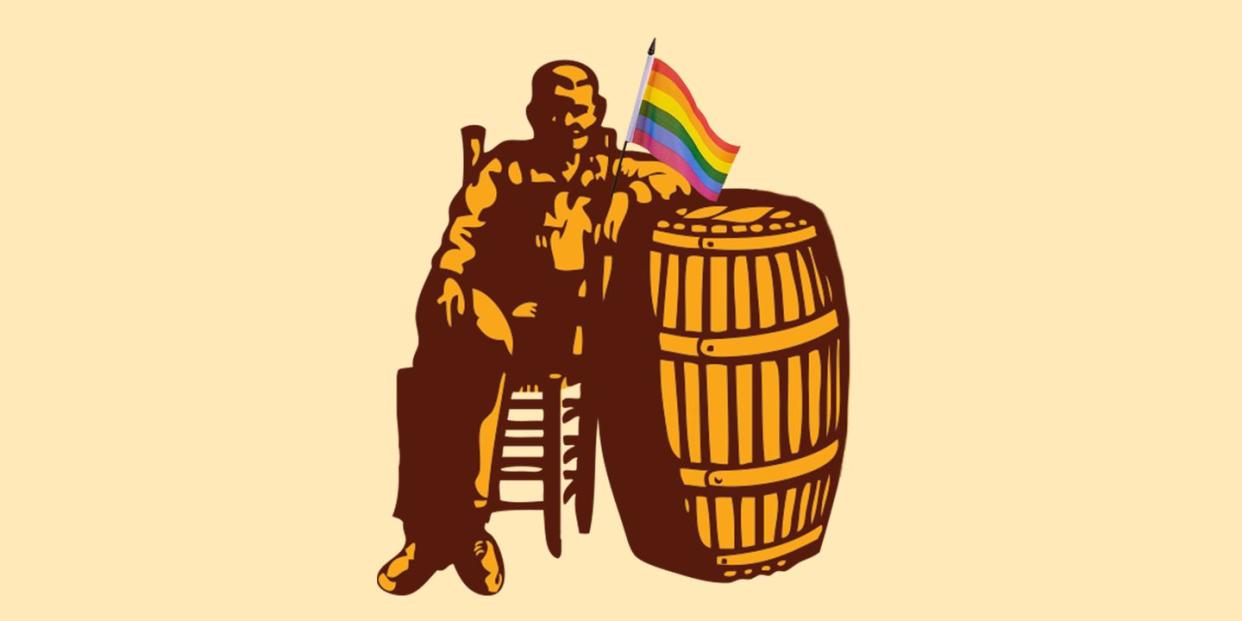Cracker Barrel's Road to Redemption Was Long. Its Progress Is Encouraging.

When I saw Cracker Barrel trending on Twitter, I figured it had to be for one of two reasons: Cracker Barrel had done something problematic, or Cracker Barrel had died. But as I came to find out, the Old Country Store had done something good. A Cracker Barrel restaurant in Tennessee had decided to ban an event scheduled by a church with some serious homophobia issues, and it was being rewarded with a flood of tweets offering praise and good memories, CNN reported. I was finally seeing the marriage of biscuits and gravy with social justice that I had been dreaming of for years.
So much of my Tennessee childhood was spent scanning Cracker Barrel's menu of deliciously beige foods while playing the signature peg game placed on every table. (I remain convinced there is no way to get to one peg.) But the older I got, the more the reality of Cracker Barrel's history became clear. In the early '90s, the company issued a memo saying employees who did not portray “normal heterosexual values” should be dismissed. In 2004, it came under fire for allegations of racial segregation of customers after the Department of Justice found proof of discrimination against minority diners. In 2013, it removed Duck Dynasty merchandise after the famous family’s patriarch, Phil Robertson, likened homosexuality to terrorism. One day later, the merchandise was back on its shelves.

Cracker Barrel was broken. After its 1991 discrimination memo, the company waited more than a decade before finally including sexual orientation in its non-discrimination clause in 2002. In the Human Rights Campaign's 2008 report on corporate equality, Cracker Barrel bottomed out with a score of 15 out of 100. It continued to flounder over the next decade, but by 2019, had lifted its score to an 80 out of 100, up 20 points from last year's 60. It has added equal marital benefits for employees in same-sex marriages, along with employee training regarding LGBTQ diversity. That history makes the company's decision this week all the more exciting. The road to redemption has been a long one.
It started in early June, when Grayson Fritts, a Tennessee police detective who moonlights as a Baptist pastor, gave a sermon calling on the government to execute LGBTQ people. It was not received well. Footage of the sermon was taken down from the church's website, according to The Washington Post. Then, Fritts attempted to book an event for his congregation at-you guessed it-his local Cracker Barrel in Cleveland, Tennessee. The Tennessee Democratic Party heard about the plan, reached out to the Tennessee-headquartered chain, and within a couple days, the event was shut down. I like to imagine that in another world, Cracker Barrel would have issued a statement that said, “Not over our dumplins!” But alas, the company's statement was more direct, including a condemnation of “hate and divisiveness.”
Cracker Barrel is not affiliated in any way with Mr. Fritts or All Scripture Baptist, and we are not hosting any event on June 29th. Please see our full statement below. pic.twitter.com/3PIfND8xiJ
- Cracker Barrel (@CrackerBarrel) June 18, 2019
Most notably, Cracker Barrel stated: “We work hard to foster a culture that is welcoming and inclusive.” That alone would have made any Cracker Barrel patron choke on their 99-cent rocky candy back in the day, when Cracker Barrel's culture was rife with discrimination and prejudice.
Cracker Barrel isn't just your grandma who makes really good chicken pot pie but can’t seem to comprehend that the only appropriate use of the word “Oriental” is in reference to a rug. What started out as a company based in the South and Midwest has expanded to interstate exit ramps across America. There's a greater corporate responsibility for Cracker Barrel to reflect something more than a rustic aesthetic; a Southern table should be a place where anyone can come in for a meal, so long as they do so with an appetite and a sense of respect for others.
I don't mean to shame Cracker Barrel by bringing up its past. There's a power in remembering those errors to ensure that they don't happen again. There is an even greater power in a company applying the lessons it has learned. And it’s especially poignant when a Southern restaurant, based in a state that makes headlines for anti-LGBTQ legislation, makes moves against a homophobic pastor. Seeing Cracker Barrel take a stand against social injustice is almost as refreshing as sitting in a front porch rocking chair for five minutes while someone else makes you a plate of fried chicken.
Cracker Barrel has a lot to offer: Fish Fry Fridays, cornbread, kitchen décor with phrases like “bless this mess,” and some of the best turnip greens you can find in the chain restaurant circuit. And now, it is setting the bar high for a crop of other Southern-based restaurants with their own LGBTQ issues, be it Chick-fil-a or Zaxby's. The company's action speaks to something greater than who should and shouldn't eat some cornbread; it says that it respects the lives of its customers. Now, if someone could explain how in the hell that peg game works.
('You Might Also Like',)


